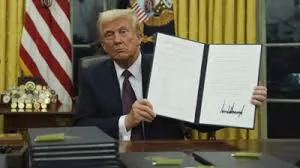
Implications of Trump’s Repeated Exit from the Paris Climate Agreement
On January 20, 2025, President Donald Trump signed an executive order directing the United States to withdraw from the Paris climate agreement for the second time. This action marks a significant shift from the previous administration’s climate policies and has been met with criticism from environmental groups and policy experts.
The Paris Agreement, adopted in 2015, is a global accord aimed at combating climate change by limiting global temperature rise. The United States initially withdrew from the agreement in 2017 under President Trump’s first term but rejoined in 2021 under President Biden. The recent withdrawal signifies a renewed commitment to prioritizing fossil fuel production and reducing regulations on oil and gas companies.
International reactions to this decision have been mixed. Some countries and environmental organizations have expressed disappointment, emphasizing the importance of global cooperation in addressing climate change. Others have indicated a willingness to continue their climate commitments independently of the U.S.
The withdrawal from the Paris Agreement is part of a broader set of executive actions taken by President Trump on his first day in office, including the withdrawal from the World Health Organization and the declaration of a “national energy emergency” to reverse U.S. climate regulations and boost oil and gas production.
This development underscores the ongoing debate over the balance between economic interests and environmental responsibility in U.S. policy. The long-term impact of this decision on both domestic and global climate efforts remains to be seen.